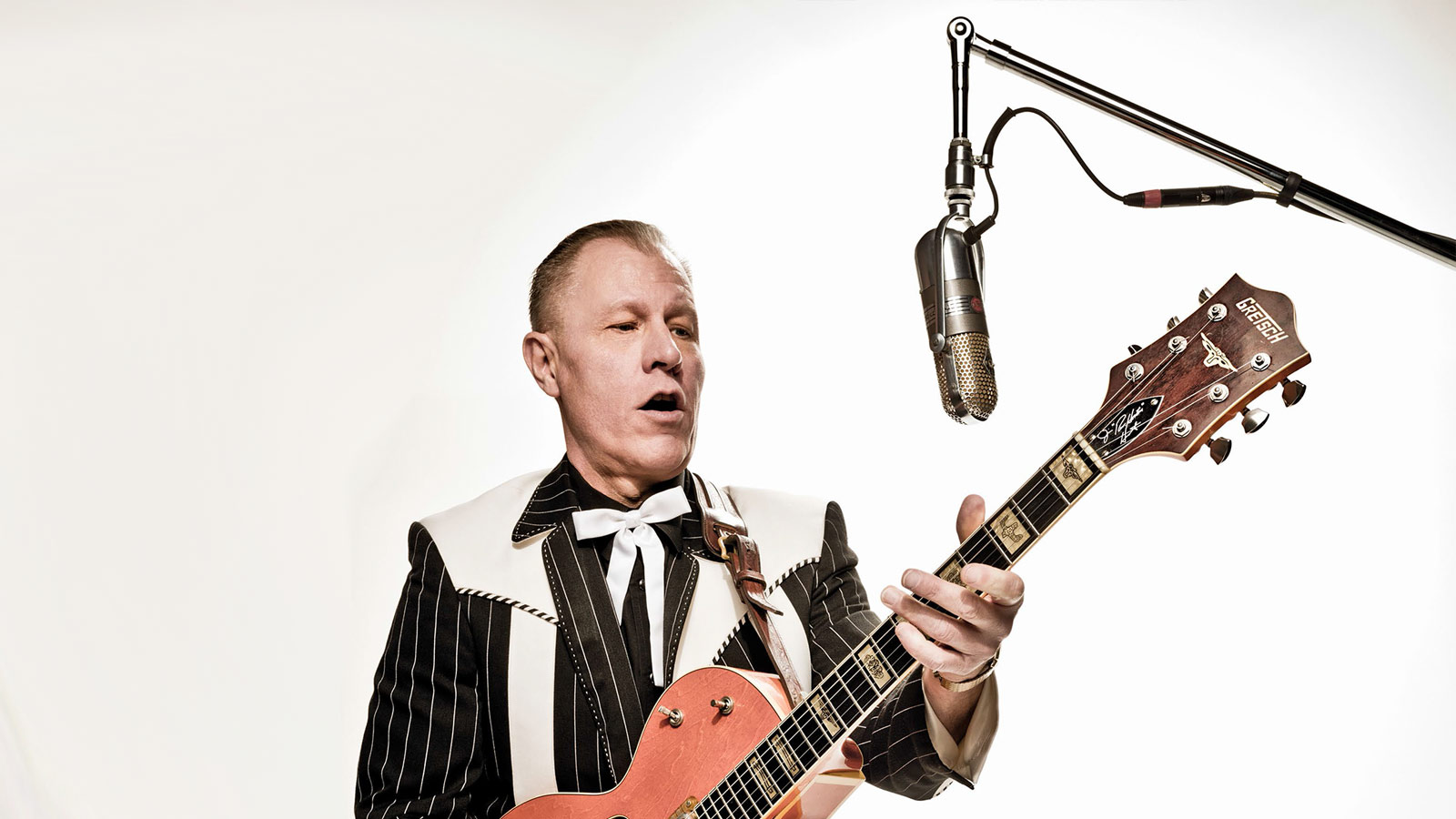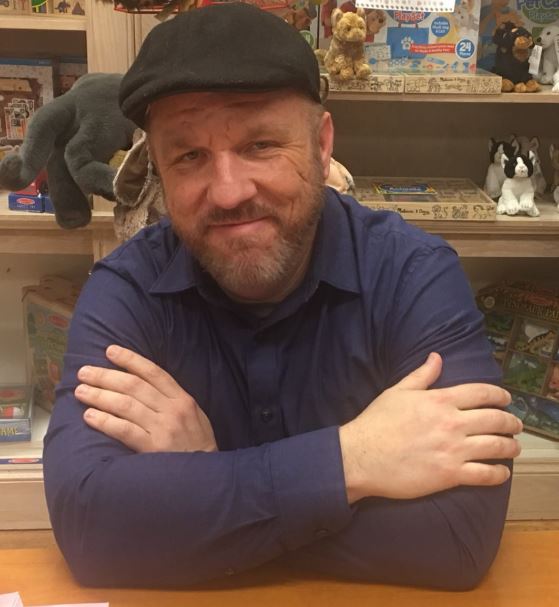Reverend Horton Heat's Jim Heath Talks Lemmy, Gretsch Gear and New Album, 'Whole New Life'
He's the godfather of modern rockabilly and psychobilly and has one fine-looking signature Gretsch. But what Guitar World readers really want to know is...

The Texas-based guitarist — better known as the Reverend Horton Heat — has been called the “godfather of modern rockabilly and psychobilly” and has got himself one seriously fine-looking signature Gretsch model. But what Guitar World readers really want to know is...
How did you discover Gretsch guitars? —Mike Collins
I like to say the guitar found me. I have this great 1954 Gibson ES-175 with P90 pickups. It sounds awesome but buzzes a little bit. Especially in older venues. It was my main guitar when we were out on tour in 1989. Things were going great and then all of a sudden, it started crackling out on me during the show. I kept trying to fix it every day, and just when I thought I’d have it fixed, it would go back out. Finally, I went to Guitar Center and discovered that Gretsch was making guitars again. I pulled one off the wall. It had the Filter’Tron pickups so it didn’t buzz as much, and the bridge pickup sounded almost like a Tele. It was something my Gibson just couldn’t do. I was on the road at the time and needed a guitar to do the job. So I got the re-issued Gretsch and was off to the races.
What’s unique about your brand-new album, Whole New Life, and how do you change things up from album to album while staying true to your genre and fans? —Serge Caspar
Lyrically, a lot of my songs are kind of dark, but this album is the most positive one I’ve ever done. We’ve got a couple of new guys on the album: a piano player, Matt Jordan, and an excellent new drummer, “RJ” Contreras. Me and [bassist] Jimbo [Wallace] are having a blast. As far as keeping things fresh, sometimes I'll take a singing or guitar lesson. Having just one lesson with the right guy might show me something I never knew before. I like to try different things, but still want us to have our own sound.
![[from left] Jimbo Wallace, Matt Jordan, Jim Heath and “RJ” Contreras](https://cdn.mos.cms.futurecdn.net/wzZ6bjFBjY3fhvhHS5d8nn.jpg)
What’s your songwriting process like? —Michele Watkins
A lot of times it starts with me in my rehearsal studio, just playing guitar and making crazy abstract lyrics or melodies with my voice. A lot of it is garbage, but all of a sudden I’ll get a hit on something cool. A turnaround or vocal thing over the chords I’ve been playing. That’s the inspiration and when I’ll say OK, I can make a song out of this. Then I’ll start the building process and grinding it out.
Get The Pick Newsletter
All the latest guitar news, interviews, lessons, reviews, deals and more, direct to your inbox!
Has the addition of Matt [Jordan] to the band changed your approach to writing or playing? —Jeff Smith
Not really. Even though I’m a guitar player, a lot of my songwriting style is influenced by piano players like Jerry Lee Lewis, Little Richard and Professor Longhair. Having said that, it’s great having Matt in the band. He’s a fun guy to play music with.
Who or what inspired you to play guitar? —Dillan Utley
When I was young, I used to watch my cousins play at family gatherings. That made me want to play. But it was also the Beatles and other music of the day. The first song I ever tried to learn how to play was “Folsom Prison Blues” by Johnny Cash when I was about 6.
You have a very firm understanding of harmony in terms of your approach to solos, songwriting and arrangements. Did you study with a teacher or were you self-taught from listening to records? —Graham Fraser
I took lessons for a while and then got involved with people who were better than me and learned from them. I also taught myself little bits and pieces about chord theory and terminology and took some music theory in college. At the end of the day, you’ve got to put in the practice. I’m thinking about starting regular guitar lessons again. I’m always looking for a concept that can springboard me into all sorts of new licks and songs.
What are the best “bang for the buck” scales or techniques that you use? —Chris Hinkelmann
When I was younger, learning modes was a good thing to know. Understanding your fretboard and how to play in different positions up and down the neck can be really helpful. I play a little in each position and have licks in each one. I’ve also learned a lot by playing arpeggios in every position. It’s amazing how just changing positions as you play can light things up. It makes it easier to come up with something creative and interesting.
You’ve performed with a lot of well-known rockabilly and roots-rock guys, but is there anyone from any other genre that you’d love to share the stage with? —Earl Konstantine
We’ve been backing up a lot of people lately who aren’t in our genre, like Jello Biafra, the singer from the Dead Kennedys. I always thought it might be kind of cool to try to get John Lydon from the Sex Pistols and back him up. I’m open to anything. Even a really good jazz/fusion guy. I’d love for us to back up Jeff Beck. Jeff is one of the best rockabilly guitarists in the world, and it’s not even really his style. It’s amazing how good he is.
How did you meet Lemmy Kilmister from Motörhead and do you have a funny story you could share? —Nathan Brown
Lemmy used to come to our shows. He loved real vintage, straight-up rock and roll and knew all about rockabilly. He was a fun guy to be around and someone who liked to hang out and be social. He could also be a little crotchety. I remember one time when we backed him up. I got the email and noticed that “Ace of Spades” wasn’t on the list of songs we were going to learn. When we got to rehearsal I said, “Lemmy, we’ve got to do ‘Ace of Spades’.” He looked at me and said [imitating Kilmister], “No. I won’t do THAT song.” I said, “But Lemmy, we’ve got to do it. It’s one of your biggest songs. That’s just giving the people what they want.” That’s when he said, “Never give them what they want. Give them what they need!” [laughs].
What advice would you give to aspiring musicians? —Jay Montoya
The one thing I try to tell everyone is that you shouldn’t expect to be a rock star. Having said that, if your band can draw a crowd in your hometown, then you can do that anywhere on the planet. It just takes an excessive and crazy amount of work and touring. If you can do the touring you can make a decent living. Some people might say they won’t go on tour unless they have a record deal but you may never get the record deal unless you go out and tour. It’s a hard life, but there are a lot of other jobs that are harder than that.
“Indigo Friends” is my favorite Reverend Horton Heat song and riff. I’ve tried learning the song by ear but just can’t get it. Is there a secret to playing it correctly? —Frank Cuevas
I haven’t played that song for a long time so I’d have to go back and listen to it to remember. I will say that a lot of my stuff is tricky because I’m a cheater. Sometimes I’ll do a chord change and realize that if I let an open “B” ring out it will become a whole different-sounding chord that’s cool. There will even be some of my licks where I’ll do a run high up on the neck and then throw an open string in there somewhere. That can make it tricky for someone who’s a beginner to figure out. I’m not sure if I did that on that song, but try it.
I happen to own one of your signature Gretsch G6120RHH models, but I don’t have a custom pickguard like yours! Where’d you get it? Don’t worry, I won’t put your name on it. I’ll use my own! —Jean Valjean
One of my favorite guitar players is a guy named TK Smith. He can play jazz, swing and rockabilly lines like nobody’s business. He also makes incredible guitars, pickups and other things. I sent him a traced outline of my pickguard and he made one that fits right on my guitar.
I noticed you once played a different, and really cool-looking, guitar. After a little research, I learned it was a TK Smith and that you referred to it as your “Smith Special.” Could you tell us more about this guitar? —Jeff Smith
TK’s design is influenced a lot by the guitars of Paul Bigsby. Paul didn’t make many electric guitars but the ones he did make were used by some of the best guitar players in the world. TK did his own take on a Bigsby. He found an original Bigsby and took the pickups out, he tested the magnetism and how they were wrapped and then re-engineered them. He’s a precise builder that uses nothing but vintage, American tools. It's not a solid body because it’s chambered and doesn’t have F-holes, but it has a real vintage vibe.
Describe your most memorable gig and why. —Darren Anderson
There’s been many, but one really good one was we opened for Soundgarden on a tour back in the Nineties. Those were big shows and on one of them the tour joined up with the Nine Inch Nails tour. That was also back when Marilyn Manson was still new and he opened for us that day. There were 32,000 people there and we had to go on after Manson and before Nine Inch Nails. And you know what? It worked out great. The thing about our music is that it’s so fast and energetic that we can win over certain types of crowds that people wouldn’t expect, and metal is one of them. We also knew a lot of metal fans because we had already opened for White Zombie and Motörhead. I remember looking up at one point and seeing this giant mosh pit. It was insanity!
For the guitar tone on Smoke ’Em If You Got ’Em, I understand you used a Gibson and ran it through a Fender Super Reverb. What were your settings and were you using any pedals and/or delay? —Scott Gupton
For most of the Smoke ’Em If You Got ’Em album, I already had the ’89 Gretsch re-issue. I plugged it into a red Boss analog delay pedal and then into the Super Reverb. That’s really it.
James is a guitarist and freelance writer who's interviewed some of the biggest names in music. He is the author of four books and his writing credits include work for Guitar World, AXS and Yahoo! as well as for his hometown newspaper where he writes on a variety of topics with both passion and humor. As a guitarist, he's performed everywhere from local bars and nightclubs to some of the biggest stages in front of thousands of music fans.
“There’d been three-minute solos, which were just ridiculous – and knackering to play live!” Stoner-doom merchants Sergeant Thunderhoof may have toned down the self-indulgence, but their 10-minute epics still get medieval on your eardrums
“There’s a slight latency in there. You can’t be super-accurate”: Yngwie Malmsteen names the guitar picks that don’t work for shred


![A black-and-white action shot of Sergeant Thunderhoof perform live: [from left] Mark Sayer, Dan Flitcroft, Jim Camp and Josh Gallop](https://cdn.mos.cms.futurecdn.net/am3UhJbsxAE239XRRZ8zC8.jpg)







